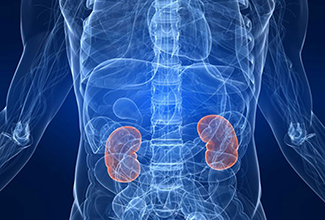Hypertension and Your Kidneys
Your kidneys, each just the size of a computer mouse, filter all the blood in your body every 30 minutes. They work hard to remove wastes, toxins, and excess fluid. They also help control blood pressure, stimulate production of red blood cells, keep your bones healthy, and regulate blood chemicals that are essential to life.
Kidneys that function properly are critical for maintaining good health, however, more than one in seven American adults are estimated to have chronic kidney disease (CKD).
About Chronic Kidney Disease
CKD is a condition in which the kidneys are damaged and cannot filter blood as well as they should. Because of this, excess fluid and waste from blood remain in the body and may cause other health problems, such as heart disease and stroke.
Some other health consequences of CKD include:
- Anemia or low number of red blood cells
- Increased occurrence of infections
- Low calcium levels, high potassium levels, and high phosphorus levels in the blood
- Loss of appetite or eating less
- Depression or lower quality of life
CKD has varying levels of seriousness. It usually gets worse over time though treatment has been shown to slow progression. If left untreated, CKD can progress to kidney failure and early cardiovascular disease. When the kidneys stop working, dialysis or kidney transplant is needed for survival. Kidney failure treated with dialysis or kidney transplant is called end-stage renal disease (ESRD).
Not all patients with kidney disease progress to kidney failure. To help prevent CKD and lower the risk for kidney failure, control risk factors for CKD, get tested yearly, make lifestyle changes, take medicine as needed, and see your health care team regularly.
- Kidney diseases are a leading cause of death in the United States.
- About 37 million US adults are estimated to have CKD, and most are undiagnosed.
- 40% of people with severely reduced kidney function (not on dialysis) are not aware of having CKD.
- Every 24 hours, 360 people begin dialysis treatment for kidney failure.
- In the United States, diabetes and high blood pressure are the leading causes of kidney failure, accounting for 3 out of 4 new cases.
- In 2019, treating Medicare beneficiaries with CKD cost $87.2 billion, and treating people with ESRD cost an additional $37.3 billion.
Risk Factors
Talk to your doctor about getting tested if you have any of these risk factors:
- Diabetes
- High blood pressure
- Heart disease
- Family history of CKD Obesity

Symptoms
People with CKD may not feel ill or notice any symptoms. The only way to find out for sure if you have CKD is through specific blood and urine tests. These tests include measurement of both the creatinine level in the blood and protein in the urine.
Quick Facts: CKD Snapshot
- Kidney diseases are a leading cause of death in the United States.
- Early CKD has no signs or symptoms.
- Specific blood and urine tests are needed to check for CKD.
- CKD tends to get worse over time.
- CKD can be treated (the earlier treatment starts the better).
- CKD can progress to kidney failure.
Kidney-Friendly Tips
- Keep your blood pressure below 140/90 mm Hg (or the target your doctor establishes for you).
- If you have diabetes, stay in your target blood sugar range as much as possible.
- Get active—physical activity helps control blood pressure and blood sugar levels.
- Lose weight if you’re overweight.
- Get tested for CKD regularly if you’re at risk.
- If you have CKD, meet with a dietician to create a kidney-healthy eating plan. The plan may need to change as you get older or if your health status changes.
- Take medications as instructed, and ask your doctor about blood pressure medicines called angiotensin-converting enzyme inhibitors and angiotensin II receptor blockers, which may protect your kidneys in addition to lowering blood pressure.
- If you smoke, quit. Smoking can worsen kidney disease and interfere with medication that lowers blood pressure.
- Include a kidney doctor (nephrologist) on your health care team.
Costs
- Overall Medicare costs for people with CKD were $87.2 billion in 2019, or $24,453 per Medicare beneficiary older than 65 years.
- Total Medicare fee-for-service spending (including prescription drugs) for patients with ESRD or kidney failure reached $37.3 billion in 2019, or $86,400 per person, accounting for about 7% of the Medicare paid claims costs.